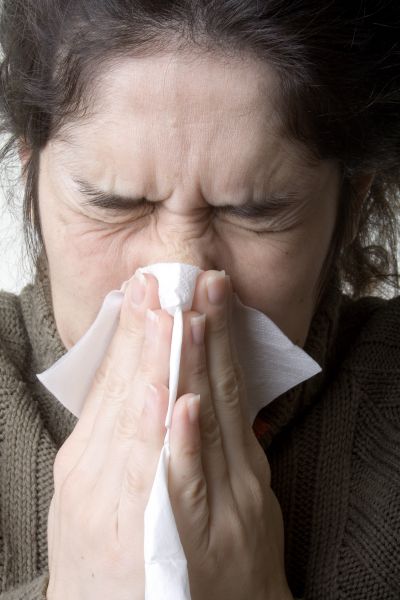When sinuses need some attention
When it comes to stuffed nasal passages, take care to not compound the problem

When those sniffles stay around for a few weeks, it’s time to see a doctor. Chances are, your sinuses need some attention. Winters and allergy seasons are when doctors start to see more patients complain of sinus problems.
“Typically, throughout the country, germs are spread in winter months. People stay indoors,” said Dr. Axay Kalathia of the Ear Nose and Throat Associates of Manatee, Fla.
Sinuses, the cavities connected to the nose, can become inflamed or infected by many things. It could be a lingering cold, caused by either bacteria or virus or allergens.
“When they are inflamed, the lining of the sinuses swell up and they don’t drain,” said Dr. John Cella of Allergy Affiliates in Bradenton, Fla. “The mucus in there gets infected.”
Sinuses help your body expel unwanted objects, such as pollen, mites or spores. When the sinuses become clogged for a long time, it could lead to serious problems, including recurring infections.
“There are degrees of sinusitis,” Cella said. “A chronic case usually lasts something longer than six weeks.”
For those who choose to go the route of self-medication to breathe better, Kevin B. Sneed, a pharmacist and a University of South Florida associate professor, advises caution. Some patients, especially those with high blood pressure, may want to watch out for products with decongestants, he said.
While shopping for antihistamines or products containing guaifenesin, Sneed recommends reading labels carefully as some are mixed with pain relievers, cough suppressants and decongestants.
Some patients may already be on other medications for other health issues and should consult their doctor or a pharmacist before buying any off-the-shelf remedy to avoid duplicating medication.
Don’t be swayed by commercials and advertisements, Sneed advises.
“Almost all these products that are over-the-counter very often have the same ingredients in them,” he said. “It all comes down to a marketing game. Almost every retailer out there has their own versions.”
Sneed and other medical professionals offered opinions on some common over-the-counter remedies:
•Nasal rinse/irrigation, such as the Neti Pot. Recommended by Drs. Kalathia, Cella and Sneed, these rinses are a safe way to relieve nasal congestion with few side effects.
The method is believed to have derived from an ancient Ayurvedic tradition and is gaining in popularity.
The concept is simple: Patients rinse out their nasal cavity with saline by using either a teapot-looking device called a neti pot or a special squirt bottle. The devices employ gravity or pressure to help drain blocked sinuses, flush out allergens and reduce swelling along the mucous lining of the sinus.
It doesn’t cure colds or infections, but helps relieve symptoms. The procedure doesn’t sting or hurt; the initial discomfort is not unlike having your nose filled with water in the swimming pool. The saline goes in one nostril and comes out in the other.
Most major pharmacies carry the devices and packets of saline mixes. You can make your own saline mixture by stirring together salt, baking soda and lukewarm distilled water. Recipes are available online.
Sneed advises patients to thoroughly clean out the device after use and not to share it with other people.
•Guaifenesin, or mucus thinners, such as Mucinex. A healthy sinus means it’s draining well. Sometimes, during an infection or cold, mucus can thicken and collect on the mucous lining. Guaifenesin, a chemical that helps thins mucus, is useful in such situations.
So far, Sneed said, there are no serious side effects associated with guaifenesin. Doctors sometimes recommend it for bronchitis and to help keep mucus flowing.
“You want mucus to be thin, you want things to flow out,” said Kalathia. “If it’s thick … it causes more swelling.”
Sneed recommends that patients drink lots of water while taking medication with guaifenesin.
He, Kalathia and Cella all caution consumers to check the labels before buying the medications. If the sinus condition does not go away in two to four days, Sneed recommends seeing a doctor.
•Decongestants, such as Sudafed. Decongestants constrict blood vessels, which can open up nasal passages, Sneed said.
If you have high blood pressure or are at risk for stroke, decongestants aren’t good remedies because they can increases blood pressure. But for people in their 20s and 30s who are healthy, there is nothing wrong with trying it out for a few days, Kalathia said.
If you start feeling any untoward effects, see a doctor right away, he recommended.
The most effective kind of decongestants – ones containing pseudoephedrine – have been removed from over-the-counter shelves to behind the pharmacist’s counter because of their potential to be turned into methamphetamine. Patients have to present an ID to buy them.
Doctors also warn consumers to use topical decongestants such as nasal sprays sparingly. Some rely on them so much that they become addictive.
•Antihistamines, such as Benadryl, Claritin or Zyrtek. Antihistamines are usually the first line of defense for those suffering from allergies. They suppress histamine – the body’s natural defense mechanism against invading allergens – by producing mucus.
“Antihistamines stop the histamine release, it stops the nasal drip and provides mild relief for congestion,” Sneed said.
In sinus passages, that translates into drying up mucus. That makes them a double-edged sword, Kalathia said.
“With sinuses, you want things to flow,” he said. The more mucus that gets stuck in the passages, the more it may prolong the illness.
There are two kinds of antihistamines on the market, ones that make you drowsy and less-sedating ones. For older people and for those who operate heavy machinery, Sneed recommends the latter.